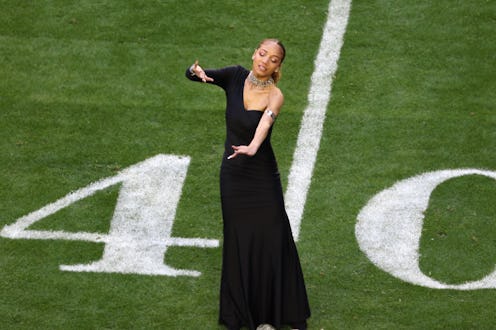Celebrity
Rihanna’s Halftime Show Sign Language Interpreter Went Viral After The Super Bowl
Justina Miles made history as the first female performer who is deaf to interpret at the event.

Rihanna’s long-awaited Super Bowl Halftime Show was historic for very unexpected reasons — she became the first halftime show headliner to reveal she was expecting a child during the event and perform while pregnant. The show also incorporated the first female performer who is deaf to interpret the halftime show for viewers: American Sign Language interpreter Justina Miles, whose energetic performance has gone viral on Twitter and Instagram.
While viewers watching the Super Bowl on TV with cable weren’t privy to Miles’ history-making performance, fans who streamed the halftime show online caught her ASL signage, and for many, she quickly stole the spotlight. Miles captured all of our reactions when RiRi opened with “Bitch Better Have My Money” before going on to break it down to hits like “Where Have You Been” and “Rude Boy.” For moments like the “Pose” dance break during “Pour It Up,” Miles did all of the moves fans would usually save for living room dance parties, and for that, Twitter was just as impressed with her as they were with Rihanna’s performance.
While this is many people’s first time seeing Miles, she’s actually used to online fame. She first went viral on Twitter after user ToyaRochelle retweeted a TikTok video of her signing a verse of rapper Lil’ Kim’s 1997 hit “Crush on You.” But aside from her ASL talents, Miles is also an accomplished athlete — winning a silver medal for the Team USA track team at the 2021 Deaflympics in Brazil — and a nursing student at HBCU Bowie State University.
Miles told CNBC’s Make It just how much signing at the Super Bowl meant to her and Deaf communities. “I value the opportunity to make it possible for all deaf people to enjoy these songs, and not have them miss out on the full Super Bowl experience,” she said. Miles also signed for Sheryl Lee Ralph’s pre-game performance of “Lift Every Voice and Sing,” which is considered by many as the Black national anthem. “To really bring that empowerment to millions and millions of Black deaf people all over the country who've never really seen that before, I feel that is truly lifting every voice, even my voice,” she added.